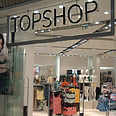
Topshop prices in Israel cut by 15-20%
Sakal Group reduces prices of garments sold in 20 Topshop, Topman, Miss Selfridge and Dorothy Perkins stores due to strong competition in fashion market. Prices likely to remain higher than in Britain
The decision was made together with the global chain of clothing stores and its group of brands.
Even after the reduction, the prices will likely still be higher than in Britain. At the moment, some items are sold in Britain for prices which are at least 30% cheaper than in Israel.
For example, boots which cost NIS 700-750 (about $180-195) in Israel cost only NIS 500 ($130) in Britain. A shirt sold in Britain for NIS 200 ($51) is sold for NIS 350 ($90) in Israel. Sometimes, however, the price differences are smaller.
The chains are owned by Sir Philip Green's Arcadia Group. Topshop opened its first store in Israel in 2003 at the Ramat Aviv Mall, and today Sakal operates 10 stores in Israel under the brand name. Topman has four stores in the country, and Miss Selfridge and Dorothy Perkins have three stores each.
Response to strong competition
The move, initiated by Sakal Holdings Chairman Haim Sakal, who imports these brands to Israel, is aimed at increasing the chains' market share in Israel at the expense of competing fashion chains.
Sakal believes that "a business that fails to reduce consumer prices will become less relevant. Sakal Holdings will improve its competitiveness, focusing on three things: Reducing the burden of costs and increasing efficiency on all levels; improving purchase prices, and bringing the improvement to our customers, who expect to see us sweat and try harder for them; and improving the organization's survival power as an economic body in a tough business environment.
"The international brands we represent understand that this is our duty right now. We will seriously consider selling brands that won't join the move –or naturally reducing their exposure to the Israeli consumer in our group."
In the past year, the MANGO fashion chain's franchise holder in Israel initiated a similar move of reducing prices in order to survive in the local market. The Israeli fashion market has become saturated with competition, leading to a drastic drop in prices in recent years.
Price reductions began upon the arrival of H&M, reaching a peak when Forever 21 opened its first store in Tel Aviv's Azrieli Mall. Meanwhile, small local chains like Twenty Six have begun offering fashion for bottom prices, in addition to hangars selling brands for import prices.
As a result, Israeli chains like Bonita and Grip have run into financial difficulties, and the more stable chains like Castro and Fox are reporting zero growth this year and complaining of an increasingly difficult market.
'Fashion market fails to grow'
"We are in a very difficult market," Castro CEO Gabi Rotter said recently. "The social protest was about food, but it made people consume less. There is a strong anti-consumption movement, while in the fashion industry prices are only dropping.
"We must make more efforts to achieve the same results. Our basic profitability is wearing out, wages have gone up, rent hasn't gone down, and we are in a worse situation compared to previous years.
"Our level of competitiveness is better than in previous years, because we have had to deal with international brands… Today our goal is to give the customer a better value proposal, while some chains offer a lot of sales. We are troubled by the fact that our level of spending increases and that we can't raise prices but only cut prices.
"Expenses increase by 3% every year, while the consumer price remains the same or falls. In the coming years we'll have to get used to a very saturated market."
Fox CEO Harel Wizel agreed: "The fashion market did not grow this year. It's at 0%. Today, there is not a single product we buy which doesn’t have a final retail price. In the past we would choose and then pay. Today it's according to the price."










